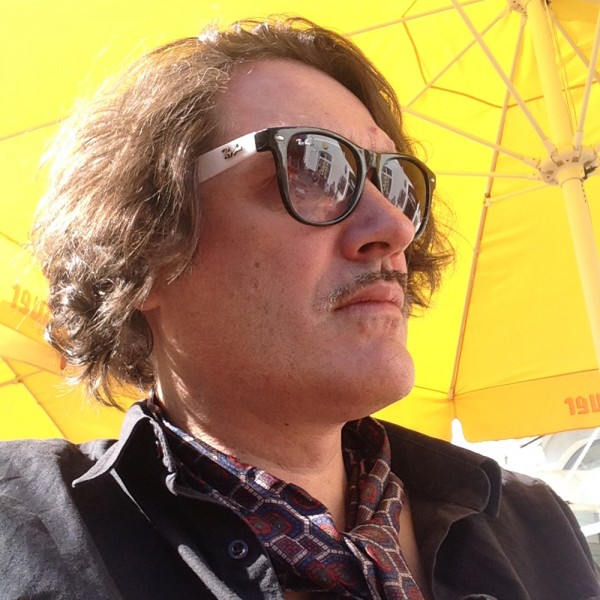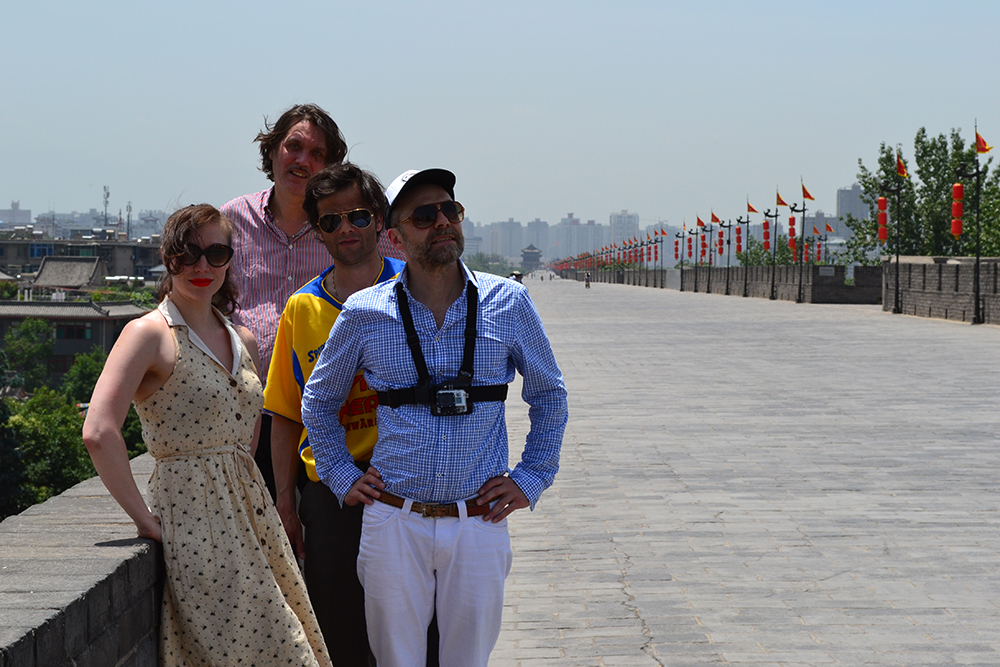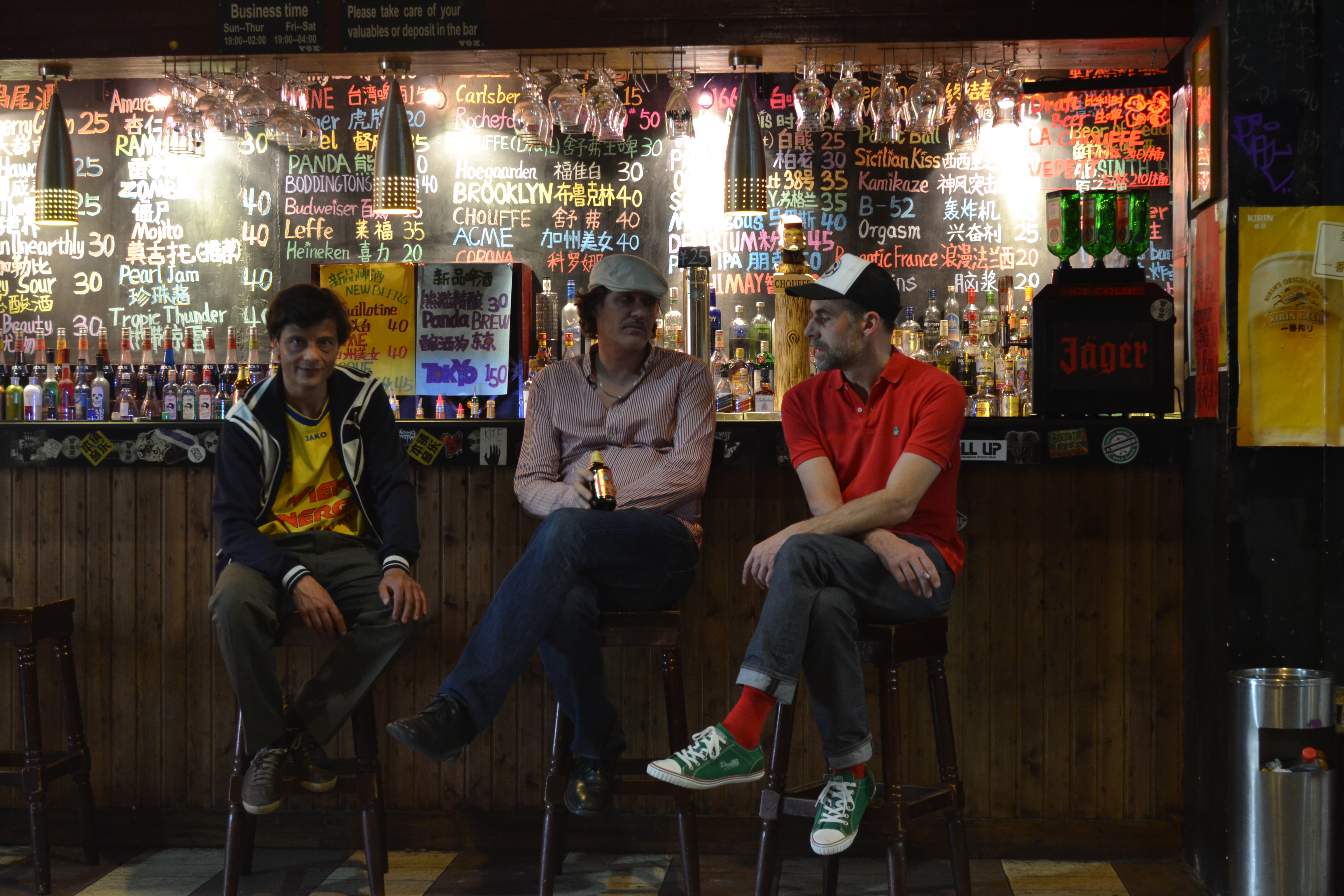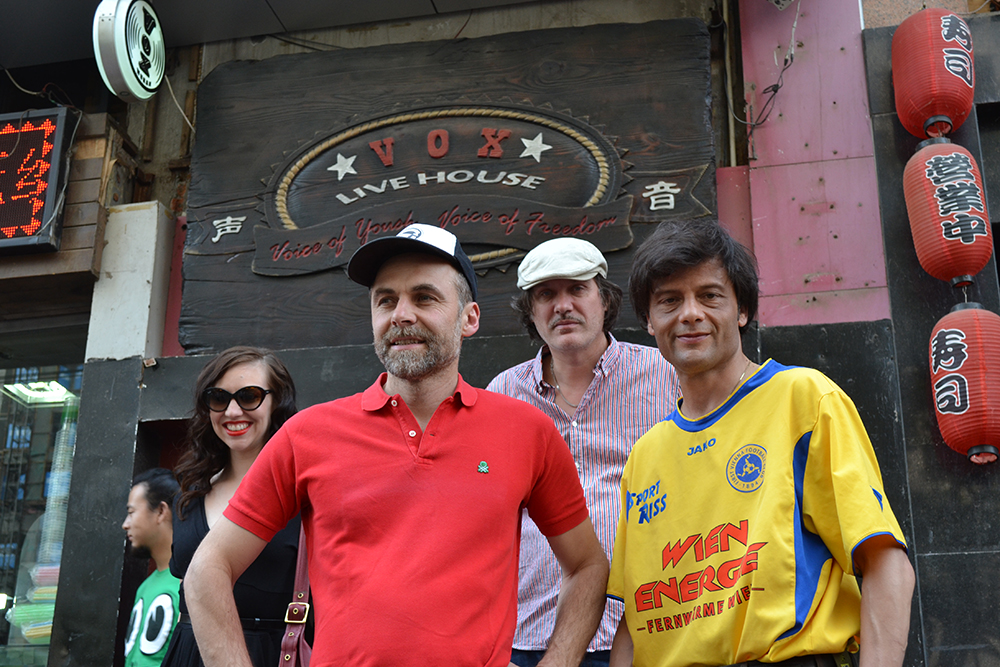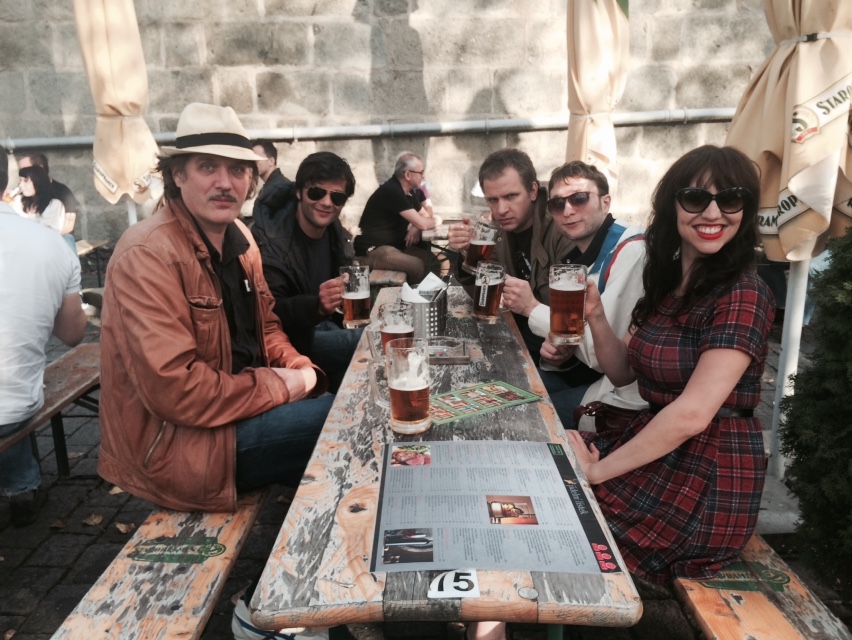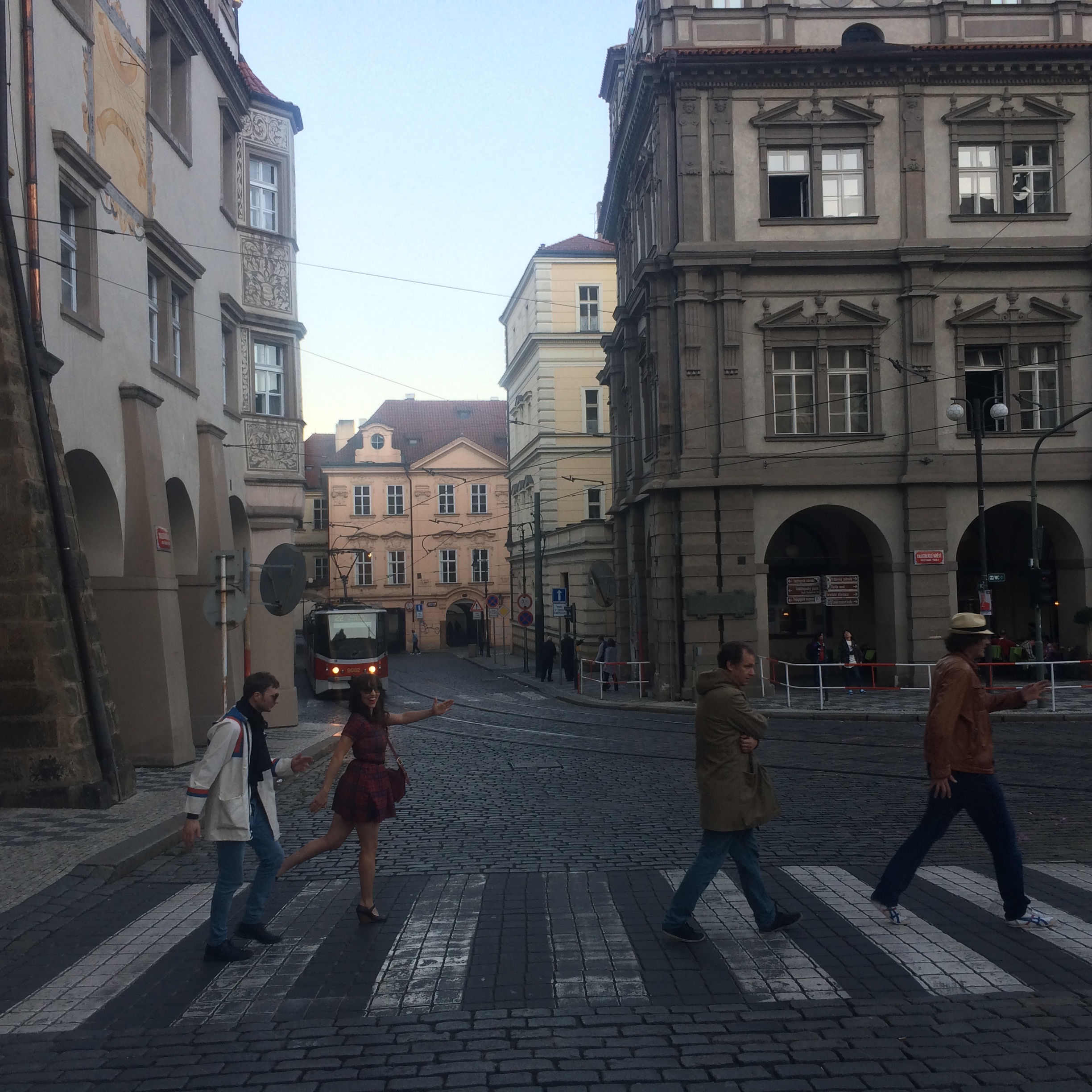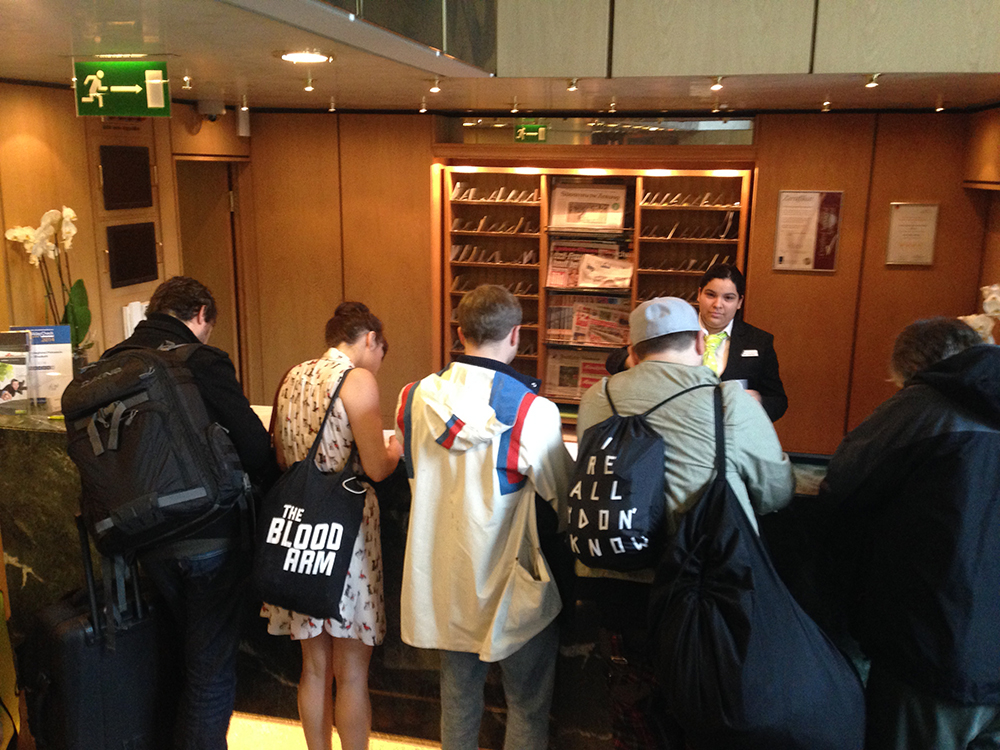„As a band you can’t just chase the money. That would be a trap.“
While the German goverment continues to push austerity and the liberal-conservative press frets over a too-low inflation rate, most regular citizens have other business to take care of: surviving in the era of ever falling incomes. Not everybody is participating in the journey to the top.
And as is traditional, artists are at the forefront of the new “precariat”- those statistically making under €1000 a month (reported by the Künstlersozialkasse, the German body that supports artists and writers in hard times). It’s tough out there all right.
Generally, of course, artists don’t like to dwell on such grey, Earthbound issues. Thankfully Frank Spilker, singer of the Hamburg based Band Die Sterne, one of the most profilic and succesful german indie pop bands since the early 90s, is willing to discuss ‘the numbers’ with us.
Frank, thank you for having this talk with me. Most readers might be surprise that we picked you for this conversation, as they don’t imagine that a band like Die Sterne would be touched by these problems. But you are, right?
Indeed, people do probably have the wrong idea of our situation. Which makes sense if you were looking at our shows in Berlin and Hamburg with full houses, say 600 and 1500 per audience. With numbers like this you make money. But we only have 3 or 4 cities in Germany where it’s like that… in Gelsenkirchen or other smaller towns, we can’t expect these kinds of crowds.
The problem for an indie band like us are the high production costs. The smaller the venue, the faster all takings are gone. I mean, a concert with 100 people is obviously still better than none, as we get at least a hotel for that night. But off-days are a no-go these days.
Let’s dig in, help us understand the production costs. What do they include? Bus, driver, hotel, mixer, merchandise guy and tour manager?
Exactly. At least in the old days that was the lineup. Nowadays we try to reduce the team. Which means either a driver/merchandise person or a tour manager but not both. And I’m not just the singer anymore, I also do the accounting with the clubs after the show. But still we need between 100 and 200 visitors to break even.
Last night in the bar you mentioned earning €8000 in total from your last Die Sterne tour through Germany. Kind of a disturbingly low figure – I guess you also expected more, right? Given that a tour is the main income for a band besides merchandise, record sales and publishing money – what does that mean to you?
We aren’t newcomers anymore, maybe we are a band past its prime? That said, it is fairly normal that we appeal to fewer younger people these days and are seeing some smaller audiences in general. But honestly, the income from touring is not the problem. We pretty much make the same money we always did.
Does inflation play a role too? Since you started things have gone up, what 25% by this point?
Of course not. But still this is kinda okay for me – we’ve been going 20 years. Also people accept highter ticket prices these days, which is helpful. But we totally lost most of our income from records sales – this is the disturbing part of the calculation. We need to sell around 5000 cds these days to recoup all our costs.
Some way to go in 2014…
Yes. At least the label can still reaching break even easily ebough, even making some profits, but it’s so much less than people think.
So how do you deal with this? How does Die Sterne reach break-even now, and keep going? Or is just you as the main songwriter who can get there? Is this a thing you’ve all already had to discuss?
We definitely need new strategies. One is, as said, to keep the money tight and cut costs. The other to find new income possibilities. But how far do you want to open your world to that? For us the deal with Jägermeister for their so called Rockliga was about as far as we could go. We said: „Okay, if they are so stupid as to blow this much money, we’ll take it and the next 2 years are fixed, solved.“
So right now the situation is like that: if the band is active and released a record every year and did one big tour a year, then we could make the numbers work. But we can’t take a year between to recharge, like we used to. And of course in reality we can´t do a record and tour every year – so we all have to find new jobs in between.
What kind of jobs?
Thomas Wenzel works for theater and produces radio plays. Christoph Leich is working 40-hours-a-week within the music industry.
How did it feel after all these years as a full time band, for someone in the band to have to get a “real job”?
Well, I have to admit, it all started with my ambition to record a solo album between the Die Sterne albums. That meant for the other three (Richard von der Schulenburg left the band since then) that they could not expect any income from Die Sterne for quite some time. A tough decision, but a necessary one, artistically speaking. Not only for me, but the whole band needed some fresh air back then. As a band you can’t just follow the money blindly. That would be a trap. Since then Christoph got this job – and we have to accept that we have to arrange all our decision regarding his holiday days and so on.
You mentioned strategies. Did you try to get your publisher working on more income from television and advertising?
A publisher is a bit like a bank for pop musicians. You get an advance (a loan) from them, as the regular banks won’t give it to you. That´s it. The other strategy is to get support from the state. Or work for theaters who still have some budget to spend on music.
And where all the other artists try to get in too.
That´s true. We all suffer from the ever-shrinking market – and the übertouring we all tried for some years is definitely not working any more.
The audience got the same problems as you. You share the same milieu.
Right. We all mostly forget to take the audience’s interests, their desires, behaviours into consideration. For example, I totaly understand people downloading our albums for free, but at the same time I hope they come will still come to the concerts.
Two show tickets and one shirt equals the CD.
Exactly.
A huge problem is the way fees now work. The divide between the headliners and normal bands is getting bigger and bigger. Especially on the festival circuit.
As all the festivals have to get these few potential headliners of the season, they get overpaid and the market is getting a bit more destroyed each time. The fees have reached absurd heights for a few artists.
And there is no solidarity in the air at all. A lot of my friends are active in the electronic music community. While some are getting 5 figure fees a night, the B and C league of DJs are often struggling to get €1000 or even bookings at all as the A class people are playing more and more gigs at one weekend, not just the 2 it used to be.
That’s what we call an open and free market. Some DJs and bands are out there and with a big media profile, and that´s why they are requested more. That´s the system – and yes, nobody stands up to it. I do understand a lot of these people: they themselves worked for ages without getting good money, so why turn it down? I’ve hardly got the energy to believe in solidarity at this point.
Do you talk about all of this with other artists?
The ones where it’s going good – well they’re not talking about it. They are afraid of jealousy. And the ones on the way down also keep quiet as nothing is as deadly than giving the impression your star is falling. It is all about the illusion.
Looking at the German indie market, all these processes lead to a state were suddenly we only have two, three labels for your kind of music: Staatsakt, Tapete, Audiolith – some of them only surving through merchandise or reissues.You have to try what you can. T-shirts, your own booking team, co-publishing with major labels…. for the last of these three you would have got killed in the 90s. The truth now is: you can’t act without the security of a big publisher or financial support by the state any more.
Are you afraid that those brave, remaining label owners will lose their energy some day?
I hope the next brave ones will show up – and happily, the past shows that this is how music always works. Someone has to do that job – and someone does. But I ask myself, is this just our generation getting nostalgic for the one particular model of an alternative cultural system? How are the kids growing up now thinking about this? They grew up in an internet-enabled world, where all music history is available, where youtube is where music happens. They don’t miss the club and bar scene like we do.
Good point. They’ve got their own social space. One that looks colder to us in opposite to the warm, cosy atmosphere of Golden Pudel Club or other bars we used to hang in (and still do). But, yes, that’s our perspective. Instead of direct contact, it’s all about multi-tasking digital communication these days.
I’m not saying that one is better than the other. You’ll find better specialists and knowledge on the ’net than at the bar… but yes, the sensual element is missing.
Maybe it is only my impression, but it often seems that the majority of younger people these days just want to fit in. Why? Back in our younger days, being culturally involved meant searching for freedom, for your own tribe. It was all about music, friends and extravagance. In the 90s and early noughties we didn’t show up at work before 11… Today everybody is expected to be in at 9.30, the interns have to fill databases with email adresses, assembling new efficiencies. How has the world changed in that respect for you, as a band?
We do experiment with it. I ask myself, what is the reason for this? How did the balance of power change so much in the last 20 years? How has the production of music changed so much? And is this the way it has to be? Still, I’m not hear to record how the industry changed or write a book on this, my job is to still to produce pop music. It’s not an easy one. I have to adjust my thinking. Right now, this means, speaking honestly, I’m not sure Die Sterne is the right outfit for that – it is so difficult to break with the expectations of your audience once they grow older.
I hear you. The songs written for 20 year olds aren’t necessarily resonating with the 40 year olds…
Indeed. The audience is looking for continuity in you, they see you as a brand. But as artists we’re still searching for challenges. Maybe it’s not my role as an artist nearing 50 to have to try to communicate with 20 year olds. Maybe the their lives, their realities are too far away – I somehow doubt they want to hear my views on that.
To return to my first question, why is it so difficult to get artists talking about this topic? Why is so uncomfortable for them?I think it’s how capitalism works. One regards oneself as a product but the actual value is a bet on the future. What a label or a publisher is willing to pay for you – that’s the bet they make on the future of the artist. That said, the job of the artist it is to make the future look as bright as possible. This is why you can never speak up about the negative direction of the industry. No-one wants to hear your lack of optimism. People still want to believe in the carefree life of the artist, the mythology must still be real.
But this carte blanche artistic lifestyle, is it still a reality? I have the impression that artists now are as much the slaves of social media as everyone else. Label, fans, press – we expect them to share every aspect of their lives with the world via Twitter, Facebook and Instagram.
Because everybody wants to be a part of these lives.
Is it just the generation gap talking though? Maybe this seems all negative because our own time is shorter. The 20 year olds, younger german bands like Messer, Trümmer and so on, they don’t care about all of this.It’s a bit like the weather forecast. That little cloud ahead… who cares? You always hope it will be gone by the time you hit this period. That’s the spirit of the youth.
Yesterday the musician Gudrun Gut, (who also owns Monika Enterprises), posted her pension estimate: €261 per month.
If you only get an amount like this, you can’t be part of society anymore. Well, you are not able to buy enough food, to keep life going.
You depend on private provision. Did you start with that early enough?
Not at all. Besides the rights in my songs I wrote over the years, there is not much to expect. My pension is in the same area as Gudrun’s…
From the States we know stories of bands being part of a hyped scene like Grunge and scoring the one-off mega-deal where you were able to buy a house. But this is not America. Did you at least manage to buy an appartment?
Who are we talking about here? The German market is so small. Maybe Wir sind Helden, die Ärzte, die Toten Hosen or Rammstein, whos records did chart in the top 10 for the last decade have been able to do so. We are not in that league. And to be completely honest: with all the artistic compromises necessary for that kind of commitment, I just never had the ambition to go there.
Do you think on the day your pension stateman arrives you will argue with it: „fuck, i should have done someting else?“
This is a question that goes straight to the heart of an artistic life. For those artists I admire it was never a question of calculation, a bet on their future – it is just an imperative. There is no easy way out. There is no alternative.
You could also say: The reward is bigger than the deprivation.
Right on. Would I be more happy with a bigger pension if I’d spent the last 30 years doing some else, something uncreative? I am sure this is much worse for you than making do with a small pension.
Also the question is: what would have down the other path?
Actually I am pretty sure that I would have been happy in other professions too. My talents are in the field of words and creativity. That said: what’s really possible these days? Maybe teaching. At my age it is time to share what I’ve learned with others. Real life experience, rather than just books and theories too. But most institutions are rigidly commercial in their approach and not artistically orientated. Too bad.
Did you work in another job in the past?
I studied cultural science at one point, with the ambition to start a label. In the end I decided against that – as I believed (and still do) that you have to go full time as an artist if you want to get your chance. But the management skills I developed over the years are transferable to other areas for sure.
Frank, for how long have you lived from music?
Since 1995. Before that i did some part time jobs like working at the bar at the Golden Pudel Club or watching video tapes for a research company – a job that gave me enough money to live on with just one day of work a week. Glory days!
What’s your personal monthly minimum?
Since our children started in school my wife also helps with income. Together we need to generate something like €3000 – that´s what you need these days in an expensive big city like Hamburg.
Quite a different amount to the 20 year old who lives in a shared apartment…
Yes, they only have to make something like €1000 I guess.
How big is the pressure?
Depends on how things are going. Sometimes high, sometimes lower.
Is the family making the pressure higher or does it help reducing it?
The pressure is bigger, especially as it’s not just me I have to support, but it also helps push me, fuels my motivation.
Are your kids asking you questions about all this?
We talk very openly at home. My son is very interested. He is not afraid – he knows that it always worked out in the past, why should it not in the future. That’s how kids think, angst is for the parents.
Last year you published a novel „Es interessiert mich nicht, aber das kann ich nicht beweisen“ („It doesn’t interest me, but i can’t prove it.“). Is this a new path for your artistic future. Did someone approach you?
Yes, someone asked me but I had to write it all on my own. My agent contacted me about the idea first back in 2005. At that point I could not imagine writing a book. But by 2009 I was ready to take it on, to expose this side of me. So I needed time for this ambition to take hold.
Once the book came out, did it dawn on you that the reality of the writer’s life is quite similar to the musician? Travelling for readings to make a living. Was that a downer?
Not at all. For me the German-speaking landscape of Germany, Switzerland and Austria plus the Goethe institutions across the world are my area of operation. I am pretty happy to get the possibility to leave my desk and see people in cities like Zürich and Graz… Also, after 4 weeks I am back anyway, the German-speaking world is not so huge.
Let´s get back to the new generation of bands like Trümmer or Nerven. Do you share common values with them?
I believe so. There must be a reason we all still go to the same bar, the Golden Pudel Club. When we meet conversations are easy. That said, I am not so sure that we also share the same goals. But did we older guys of the so called Hamburgher Schule have the same targets back then? We stood together to achieve something, that’s for sure…
What was your ambition?
Back in the days in Bad Salzuflen, where we started our label Fast Weltweit, we wanted to correct the lack of communication in German pop music of those days. While listening to BFBS radio with its hosts like John Peel we felt the possibilities of lyric reception. At that time german radio did play songs like „Bobby Brown“ from Frank Zappa, but no one got what the lyrics are about. We wanted to direct one’s attention to the lyrics by writing and singing in German – and not only in a funny jokey way like for example a band like Die Ärzte. We wanted to take on serious topics as we believed that this will lead to serious discussions.







